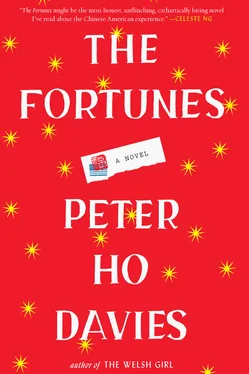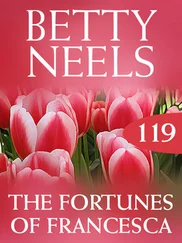“How could he?” Ling began, but she spoke across him. “It was easy. As soon as he had someone else to do my work around the laundry.”
“I didn’t know,” he breathed. As if it were an excuse.
She shook her head. “It’s nothing. Filial duty. The money helps feed my mother and sisters at home. That’s the truth.” She smiled tightly. “I remember this one girl, on the voyage out. She thought she was getting married. She was a vain, stupid, happy little thing. She told me all about her wedding plans and her fiancé who was bringing her back to Gold Mountain. Someone must have gotten sick of her bragging. They told her she was going to be a whore, and when she asked the fiancé, he just laughed. “When I said I’d make you a wife, I meant a hundred men’s wife!” She jumped overboard the next day. I remember seeing her in the water. She was Tanka, you know. She could swim. I thought we’d go back for her, but we sailed on, and all the men just stood there at the rail watching her get smaller and smaller. Someone said later she was a real saltwater girl.”
She stared at Ling’s stricken face as if at a distant horizon, and he backed away. He was still clutching his hat, crushing the brim in his fist.
She nodded as if to herself. “Who would marry into such a family?”
He stumbled out into the alley as if pushed.
“You think too much about fathers,” she called after him. “What about your mother? Do you ever give her a thought? Do you?”
Afterward, he couldn’t recall her wiping her tears away. She’d let them dry on her face like a man.
She was just a two-bit whore, he told himself, but something about the very epithet nagged him. Two bits, he knew, made a quarter, but he’d never seen a single bit. There wasn’t even a circle for one carved on Uncle Ng’s counter. Something about the absence vexed him, as if the American money he handled weren’t quite honest, the transactions conducted with it not to be trusted. He studied the quarters in his palm, coins he would have spent on her. When and how, he mused, had two bits become indivisible, so that there was no separating them?
He stayed away a few weeks, thinking she’d deal with it, but when he finally went back she was gone.
“Sold,” Ng said peevishly. “More trouble than she was worth, that one,” though apparently she’d been worth at least what he owed in gambling debts.
“To who?”
“Someone who could afford the bride price.” Ng cackled.
“Who?” Ling had demanded, and Ng had given him the name of a notorious highbinder.
“Try asking him his business,” the old man sneered, making a palsied chopping gesture. “You had your chance.”
Gone, Ling couldn’t help thinking later, like a stain washed away. He never heard what happened to a child, if there was a child.
It was the first time he’d seen Ng in months, though Little Sister had told him the laundryman asked after him. His former employer barely acknowledged him until Ling addressed him by name and the old man, the queue coiled around his head now threaded with gray, had startled, his hooded lids widening. “I thought you were a ghost,” he explained, looking Ling up and down in his suit.
Ling was eyeing Ng too. How wrinkled he seemed, the tendons in his jaw rising like stubborn creases, the sallow flesh of his fingers and wrists shrunk tight to the bone, as if he’d been left in his own laundry water too long. Only his right arm, the one he used for ironing, seemed unwithered, as if it belonged to a much younger man. Not gambling debt, Ling thought. Ng reminded him suddenly of the grandfather on the flower boat, that other prospector-turned-opium addict, face permanently pinched from sucking on a pipe. He shuddered.
“You rich now?” the old man asked.
Ling shrugged inside his new suit coat. He guessed the old head was going to ask him for money.
“Look rich.” Ng nodded. “Look proud.”
“Why not? Should I be proud to be poor?”
Ng shook his head like a dog. “Money doesn’t make you proud. They pay you for your pride, I think.” He took a long wet draw on his pipe. “Only, what if you don’t have enough pride? Eh? What if you sell it all and are still not rich? What then?”
He scattered a handful of salt on the counter before him, scraped an iron back and forth across it to clean the metal.
“Or perhaps you’re too proud to be Chinese,” he murmured. “So proud you need to be white.”
Ling had been thinking of doing the old man a favor, bringing him some business. Now that Crocker had dressed him, he liked to have Ling with him, in attendance, which meant Ling had less time for work around the home. A new cook had already been hired and the household laundry was to be sent out once more. But now he saw that he couldn’t come back here again, that he’d only thought of using the laundry as an excuse to impress Ng.
“And to think,” the old man sneered, “you were nothing but a pair of empty hands when you came.”
“She told me what you did,” Ling hissed.
“So?” Ng jerked his bony shoulders. “This is normal for poor girls. How else you think they live? It could be worse.”
Ling tried to ignore the echo of Little Sister. “How worse?”
Ng’s eyes clouded. “You know, I had a little sister. Not now, but once. Baby sister. In the time of big famine in Guangdong, before you were born. Lucky boy. No rice, no taro, no meat. People dying in the streets. With my own eyes, I’ve seen that. I and my brothers would have died for sure.”
“What are you saying?” Ling frowned. “Are you saying you…? Your own sister ?”
“ No! Who could do that?” Ng hung his head. “But my baba, he knew another family, also starving, also with a baby. And so the families… helped each other.”
“But that’s—”
“ What? ” Ng roared. “Worse than being whore? Yes, I think so. I think so very much.”
Ling found his eyes drawn reluctantly to a skinny string of Chinese sausages, even more desiccated than the old man, hanging from the rafters like a shorn queue.
“I don’t believe it,” he managed, looking away.
“You think no one could be so desperate? Yet all around you, thousands of Chinese come so far from home to risk everything. To get rich, you think, for gold? No! For food, for life. It’s not hungry spirits you should pray for, it’s the hungry living.”
“But no father would do that!”
“What do you know of fathers? He did it so the family would live. ”
“Wasn’t she family too?” Ling began, but Ng was shouting over him: “If you’d ever had a family, you’d understand.”
They were the old man’s last words to him, spoken like a curse, and flecked with so much spit that Ling had backed away, expecting the iron to follow. Only after he left did he realize the lucky hair from Ng’s mole was neither plastered to his brow nor waving silkily in the air before him, but plucked or fallen out. Little Sister, Ling remembered, had always promised to snip the loose thread on that button one day.
Months later — Uncle Ng dead of an overdose or debts, it wasn’t clear which, and the laundry under new management (a fellow called Two Nose on account of a fleshy mole on one nostril, who seemed to have converted the lean-to into an opium den) — he heard a rumor that Little Sister was dead: by her own hand, a chopstick thrust through her ear, someone said; in childbirth another. He refused to believe it, and yet his eyes stung as if from the lye of the laundry.
In his bed that night he dreamt of a secret hoard of coins, hundreds and thousands of bits, a veritable treasure. He could see them — gold, of course, with an elephant embossed on one side — but not grasp one. All those lost coins! He woke with his hands balled so tightly his palms bled.
Читать дальше












